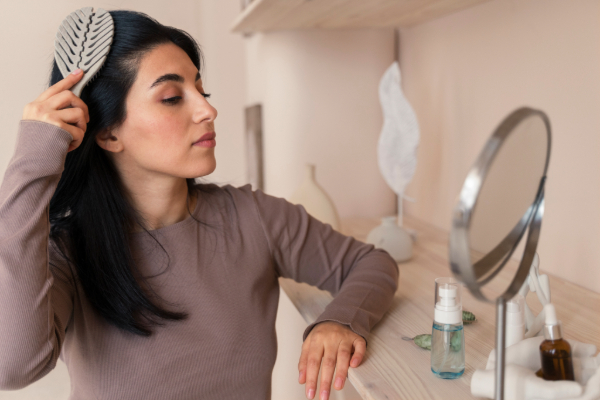04 September 2025
Why Hair Loss Gets Worse in Summer – and What You Can Do About It
If you’ve noticed more hair in your brush or shower during the summer months, you’re not alone. Many people experience increased shedding at this time of year. While some hair fall is part of the natural growth cycle, seasonal changes, sun exposure, and lifestyle factors can all make it more noticeable.
The good news? In most cases, summer shedding is temporary – and there’s plenty you can do to protect your hair and scalp.
Seasonal Shedding – What’s Normal?
Our hair naturally moves through three phases:
Growth (Anagen) – when the hair actively grows.
Transition (Catagen) – a short resting period.
Shedding (Telogen) – when hair naturally falls out to make way for new growth.
In summer, a larger percentage of hair follicles can enter the telogen phase. Some researchers believe this is an ancient protective mechanism – a “sun hat” effect – where our hair thickens earlier in the year for warmth, then sheds in summer when it’s no longer needed.
If you’re unsure whether your hair loss is within normal limits, our Hair Loss Consultations can help identify the cause and the best course of action.
Sun and Heat Exposure
While sunny days lift our mood, they can be tough on our hair:
UV damage: The sun’s ultraviolet (UV) rays can weaken hair proteins, making strands more brittle and prone to breakage.
Humidity and sweat: Warmer, more humid weather increases sweating, which can cause scalp build-up and clog follicles, stressing the roots.
Heat stress: High temperatures can dry out both hair and scalp, leaving them less resilient.
You can help prevent this with Mediceuticals products such as Mediceuticals Defend – a leave-in conditioner with UV protection.
Hormonal Fluctuations
Longer daylight hours reduce melatonin production, which plays a role in regulating hair cycles. This subtle hormonal shift can extend the telogen (shedding) phase. In some people, seasonal changes can also affect testosterone levels, which may influence hair density.
If hormones might be affecting your hair, a DNA Hair Loss Test can give you personalised insight into the treatments and products most likely to work for you.
Summer Lifestyle Factors
Our routines often change in summer – and so does our hair care:
Dehydration: Extra heat and activity can lead to fluid loss, leaving hair drier and more fragile.
Diet changes: Busy schedules and holidays sometimes mean we skip balanced meals, reducing the nutrients needed for healthy growth.
Swimming: Chlorine from pools and saltwater from the sea strip moisture from hair, leaving it dry, rough, and more likely to break.
See our Summer Hair Care Tips for more advice on keeping your hair healthy during the warmer months
How to Minimise Summer Hair Shedding
While we can’t stop the seasonal cycle, we can reduce its impact:
Protect from the sun – wear a hat or use UV-protective hair products like Defend.
Rinse after swimming – remove chlorine or salt straight away, then condition to restore moisture.
Stay hydrated – drink plenty of water throughout the day.
Nourish from within – eat a balanced diet rich in protein, healthy fats, and vitamins.
Keep your scalp clean – use a gentle but effective shampoo such as Mediceuticals Vivid to prevent build-up and keep follicles healthy.
Concerned About Your Hair Loss?
Most summer shedding is temporary, but if you’ve noticed a sudden increase in hair fall, or your hair is thinning more than usual, it’s worth seeking professional help.
If you’re looking for personalised advice or professional hair and scalp treatments, reach out to us at Hove Hair Clinic on 01273 711140. We’re here to help you achieve your goals with expert guidance and bespoke care.
